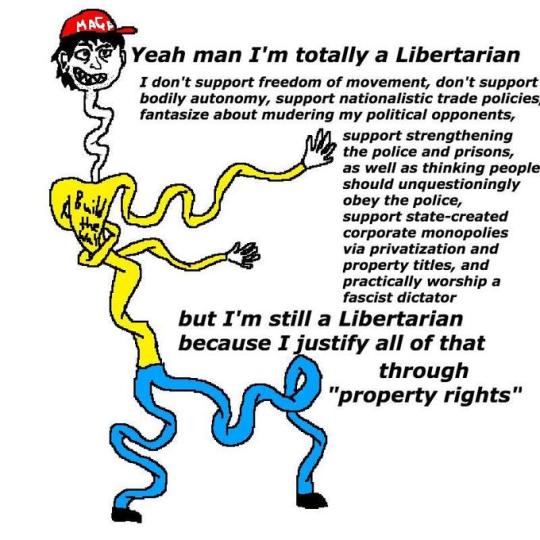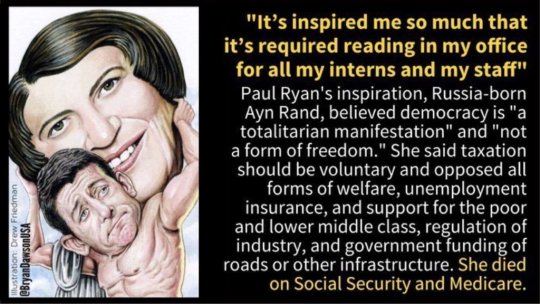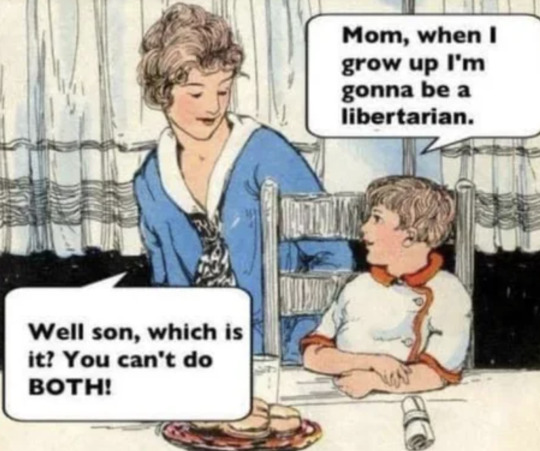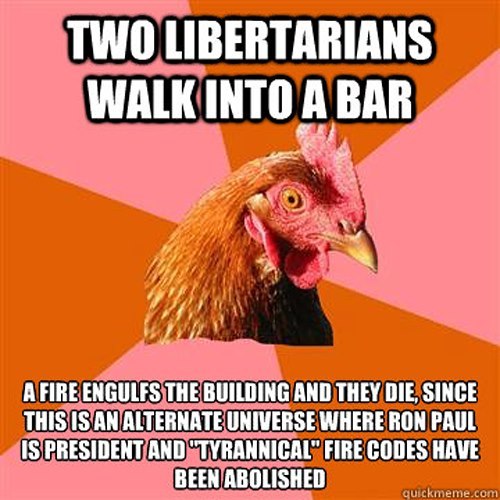#deregulate deez nutz
Text

#us politics#lolbertarians#taxation is theft and other lies by lolbertarians#fuck libertarians#libertarians be like#libertarians#conservatives#memes#shitpost#bootlickers#freedom of movement#bodily autonomy#nationalistic trade policies#political violence#fascist police state#deregulation#deregulate deez nutz#corporate monopolies#privatization#property rights
489 notes
·
View notes
Text
The Supreme Court agreed Monday to consider overturning a nearly 40-year precedent by taking up a challenge to a regulation affecting fishing vessels in a case that is the latest conservative-led attack on federal bureaucracy.
The court will weigh whether to overturn a much-cited 1984 ruling, Chevron v. Natural Resources Defense Council, which said courts should defer to federal agencies in interpreting the law when the language of a statute is ambiguous.
Attempts to overturn the ruling, which the court has rarely invoked in recent years, is just one avenue of attack by conservative groups and business interests as part of what has been dubbed “the war on the administrative state.”
"The Supreme Court has an opportunity to correct one of the most consequential judicial errors in a generation," said Ryan Mulvey, a lawyer at the Cause of Action Institute, a conservative group that represents the challengers. The Chevron ruling "has proven corrosive to the American system of checks and balances and directly contributed to an unaccountable executive branch."
The Supreme Court, which has a 6-3 conservative majority, is skeptical of broad assertions of federal agency power.
The case itself is a challenge to a government regulation that requires fishing vessels to help fund the collection of scientific data to assist with fishery conservation and management. The court could still rule in favor of the challengers by limiting the scope of the Chevron decision without overturning it entirely.
The court took up an appeal brought by Loper Bright Enterprises and several other operators of fishing vessels that are active in the herring fishery off the Atlantic coast, which challenged the 2020 rule applying to New England fisheries.
The challengers say the National Marine Fisheries Service, the federal body that oversees ocean resources, did not have authority to issue the regulation under the relevant law, the 1976 Magnuson-Stevens Fishery Conservation and Management Act.
The rule implements a monitoring program that vessel operators are required to fund. As the challengers put it, operators have to pay up to $710 a day at certain times for independent observers to board their vessels and monitor their operations. The cost is a significant burden on small owner-operators, the challengers say.
The case, backed by conservative groups, is the latest attempt to undermine the power of federal agencies. Lawyers for the fishing vessel operators say a lower court that upheld the rule gave too much deference to the federal agency in interpreting the 1976 law.
The U.S. Circuit Court of Appeals for the District of Columbia rejected the vessel operators' claims in a decision in August, upholding a similar ruling a federal district judge issued the previous year.
The brief Supreme Court order noted that liberal Justice Ketanji Brown Jackson is not participating in the case. She was originally part of the appeals court panel that decided the case before President Joe Biden appointed her to the high court. She heard oral arguments but was not involved in the ruling itself.
#us politics#news#nbc news#2023#us supreme court#federal agencies#Chevron v. Natural Resources Defense Council#Cause of Action Institute#government regulation#deregulation#deregulate deez nutz#fishery conservation and management#Loper Bright Enterprises#National Marine Fisheries Service#Magnuson-Stevens Fishery Conservation and Management Act#U.S. Circuit Court of Appeals for the District of Columbia#justice ketanji brown jackson#biden administration
11 notes
·
View notes
Text

#us politics#memes#gop#conservatives#republicans#libertarians be like#fuck libertarians#libertarians#lolbertarians#ayn rand#paul ryan#rep. Paul Ryan#taxation isn't theft#taxation is theft and other lies by lolbertarians#welfare programs#unemployment insurance#regulations#federal regulations#deregulate deez nutz#infrastructure reform#social security#medicare
35 notes
·
View notes
Text

#us politics#memes#shitpost#lolbertarians#libertarians#libertarians be like#fuck libertarians#deregulation#deregulate deez nutz#child mortality#child labor#child labour laws
30 notes
·
View notes
Text

#us politics#twitter#tweet#2023#john iadarola#tyt#the young turks#federal regulations#deregulate deez nutz#deregulation#predatory corporations#tax the corporations
18 notes
·
View notes
Text

#us politics#lolbertarians#taxation is theft and other lies by lolbertarians#libertarians be like#fuck libertarians#ron paul#fire codes#deregulation#deregulate deez nutz#memes#shitpost
9 notes
·
View notes
Text
Children ages 14 and 15 would no longer need a work permit or parental permission to get a job under a bill Republican Wisconsin lawmakers released on Friday.
The proposal comes amid a wider push by state lawmakers to roll back child labor laws and despite the efforts of federal investigators to crack down on a surge in child labor violations nationally.
Under current law, 14- and 15-year-olds in Wisconsin are prohibited from working most jobs unless they have permission from a parent or guardian and have verified their age with the state Department of Workforce Development. The Department can revoke youth work permits at any time if it believes a child’s safety is being threatened.
Sen. Cory Tomczyk and Reps. Clint Moses and Amy Binsfeld, the Republicans sponsoring the bill, called youth work permits “needless administrative barriers that slow down the hiring process.”
“It’s important that young people have the opportunity to work without having to endure excessive government regulation,” they said in a statement asking other lawmakers to cosponsor the bill.
The bill continues to require employers to keep their own records of employees’ ages and hours worked, but without work permits verified by a state agency, companies caught violating child labor laws can more easily claim ignorance.
Earlier this year, the Labor Department fined Wisconsin-based meat packing contractor Packers Sanitation more than $1.5 million for employing at least 100 children, some as young as 13, to clean dangerous equipment such as bone saws and skull splitters in plants across the U.S. The company claimed it wasn’t aware that those workers were minors but said it has since taken steps to improve the way it verifies employees’ ages.
State lawmakers across the country, largely Republicans, have in recent years embraced legislation that would allow kids to work longer hours and in more hazardous occupations. Many such bills were proposed as solutions to worker shortages, but advocates against child labor have decried the measures as needlessly endangering children.
Republican Arkansas Gov. Sarah Huckabee Sanders signed a law in March eliminating permits that, similar to those in Wisconsin, required employers to verify a child’s age and obtain a parent’s consent. Sanders later signed separate legislation raising civil penalties and creating criminal penalties for violating child labor laws, but advocates worry that eliminating the permit requirement makes it significantly more difficult to investigate violations because there are fewer records of where kids are being employed.
Earlier this year, Wisconsin Republicans proposed allowing children as young as 14 to serve alcohol in restaurants and bars. If that bill passed, Wisconsin would have the lowest such limit nationwide, according to the National Institute on Alcohol Abuse and Alcoholism.
The work permits bill proposed Friday follows little more than a month after a 16-year-old boy in northern Wisconsin died while working at a sawmill. Initial reports suggest that Michael Schuls was performing work allowed by state laws when he was killed by a wood-stacking machine, but his death and the deaths of other teen workers this summer have brought increased attention to child labor rules.
Democratic Gov. Tony Evers is unlikely to sign either of the Wisconsin proposals into law if they pass the Republican-controlled Legislature. He vetoed a bill last year that would have let 14- and 15-year-olds work later hours during the summer.
Evers’ Republican predecessor, former Gov. Scott Walker, signed a bill in 2017 that removed work permit requirements for 16- and 17-year-olds.
#us politics#news#the associated press#ap news#2023#republicans#conservatives#gop#republican family values#child labor#work permits#wisconsin#gov. tony evers#Wisconsin Department of Workforce Development#Cory Tomczyk#Clint Moses#Amy Binsfeld#deregulation#deregulate deeze nutz#Gov. Sarah Huckabee Sanders#Arkansas#Scott Walker
20 notes
·
View notes
Text
youtube
Brandon Ingram was severely electrocuted and nearly died while working at a Frito-Lay factory in Missouri. The company then denied him needed medical care. Brandon, his wife, and children have been stalked and secretly filmed by company agents for years.
The new revelations add to a troubling trend of abuse exposed by Frito-Lay workers on strike in Topeka, Kansas.
This shit is what's wrong with capitalism. This man, a veteran, worked 20 hr shifts, 80+ hr work weeks. His wife thought he was cheating. He got electrocuted due to faulty wiring, not user error. When he called in sick due to the pain of electrocution and two herniated discs in his vertebrae, his boss asked him if he was going to come in the following work day, THEN denied him a chair for desk work and said you're 'either 100% or can't work'. He lost his insurance due to not being able to work, but still had to prove he was disabled for long term disability. He had to pay for everything OUT OF POCKET, sadly, taking even from his children just to pay for his bills. Frito-Lay/Pepsi Co. hired private investigators to follow his family just to prove he was wrong in the lawsuit he brought against them (funny they have the $$ for that but not worker injuries or wages).
Inb4 all the libertarians say "Oh, see? We need to deregulate to--" Deregulate to do what? More faulty wiring? Less OSHA standards? Shit like this happens with government regulations in place. What, you think that if you get rid of "them regs" that suddenly this shit will stop? Prove to me that this shit isn't built on cruelty and suffering of the workers. Why go after his family if not to show the workers that there's a hierarchy in place, and to toe the line and not upset the Masters?
#politics#us politics#frito-lay#frito lay#unions#union workers#workers union#worker's rights#workers#working class#work#pepsi co#libertarians be like#libertarians#deregulate deez nutz#deregulation#factory workers#osha#YouTube#more perfect union#Brandon Ingram
683 notes
·
View notes